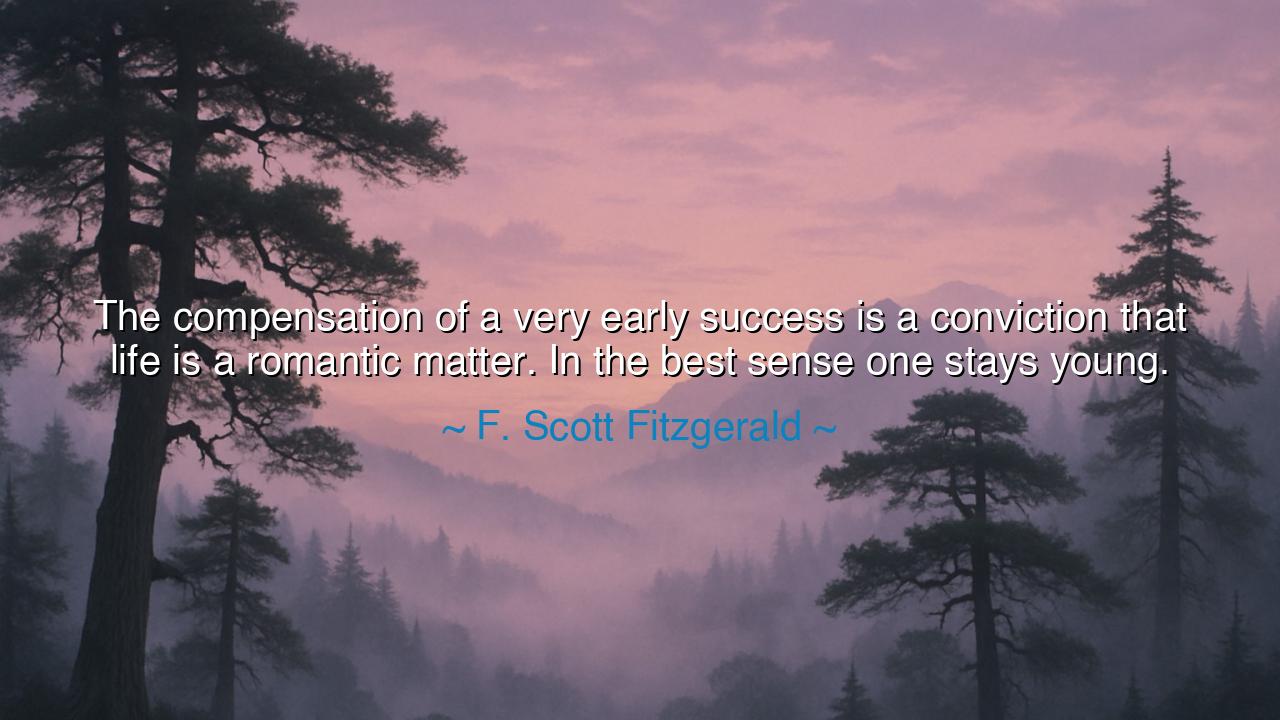
The compensation of a very early success is a conviction that
The compensation of a very early success is a conviction that life is a romantic matter. In the best sense one stays young.






“The compensation of a very early success is a conviction that life is a romantic matter. In the best sense one stays young.” Thus wrote F. Scott Fitzgerald, the chronicler of glittering youth and tragic dreams. His words are not mere observation but confession, drawn from a life that tasted triumph before its ripeness had fully matured. To achieve early success is to be intoxicated by the belief that the world is a stage lit for you, that destiny itself bends to your desires. In such a season, life appears not as burden but as romance—a continuous unfolding of wonder, where hope shines brighter than disillusion.
This conviction, Fitzgerald suggests, is its own compensation. For while early success can bring arrogance, fleeting fame, or even ruin, it also bestows a gift: the capacity to believe, perhaps naively, that life is magical. To walk with this belief is to carry the innocence of youth long beyond childhood, to see possibility where others see only obstacles, to remain open to beauty even when the world is cruel. Thus the heart that believes life is romantic does not wither easily into cynicism; it remains supple, alive, young.
The ancients knew this spirit well. Consider Alexander the Great, who, in the fire of his twenties, conquered empires and carried Homer’s Iliad like scripture. His youth was crowned with victories that convinced him he was destined for greatness. This conviction, though dangerous, allowed him to attempt what no one else would dare. For in his heart, life was indeed a romantic matter, a tale of heroes and destiny. That vision, born of early triumph, propelled him into legend.
Fitzgerald himself lived this truth. With This Side of Paradise, published when he was just twenty-three, he awoke to fame, fortune, and love. The world seemed his for the taking, and for a time he and Zelda embodied the very romance he described: young, adored, radiant with possibility. Though tragedy later shadowed his life, the belief in romance—kindled by early success—colored his art forever. It gave us Gatsby’s longing gaze, the green light shining across the bay, the eternal hunger for beauty that would outlive him.
Yet we must heed the other side of the lesson. For not all who taste early success remain sustained by romance. Some are destroyed by it, confusing the illusion of eternal youth with invincibility. Many burn too brightly, consumed by their own fire. The conviction of romance must therefore be tempered by wisdom. To believe life is wondrous is not to ignore its trials, but to face them with the resilience of one who still dares to hope.
The lesson for us is clear: whether our triumphs come early or late, we must strive to keep alive the conviction that life is more than toil—that it is indeed a romantic matter. This does not mean clinging to childish illusions, but embracing wonder, imagination, and the courage to see beauty even in sorrow. To stay young in the best sense is not to deny time’s passage, but to nurture a spirit that refuses to grow cold.
Therefore, dear listener, take Fitzgerald’s wisdom as both gift and warning. If success comes, let it kindle in you not arrogance but enchantment. Let it teach you that life can be lived with passion, with poetry, with romance. And if success delays, create for yourself the same conviction: live as though the world is still filled with possibility. For in the end, the truest youth is not of the body, but of the spirit that sees life not as burden, but as a story worth living with wonder.






AAdministratorAdministrator
Welcome, honored guests. Please leave a comment, we will respond soon